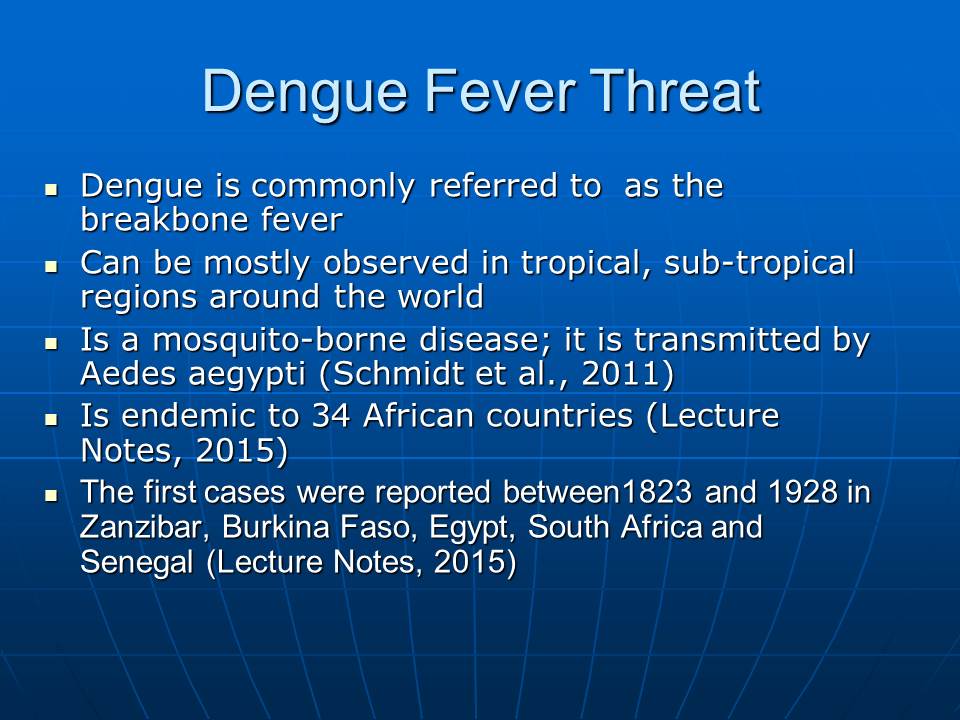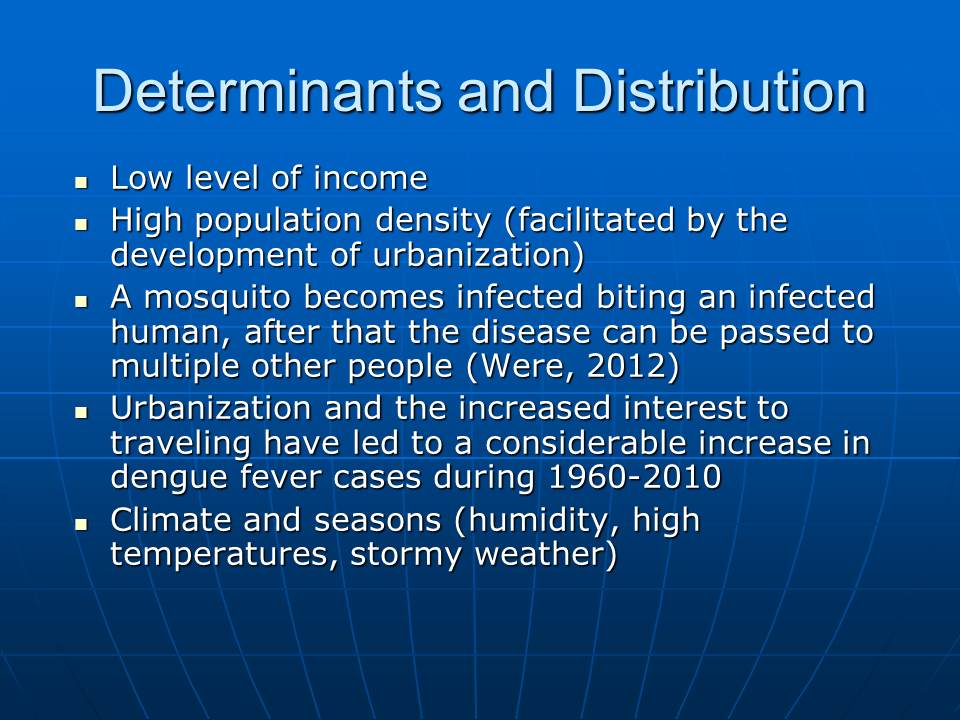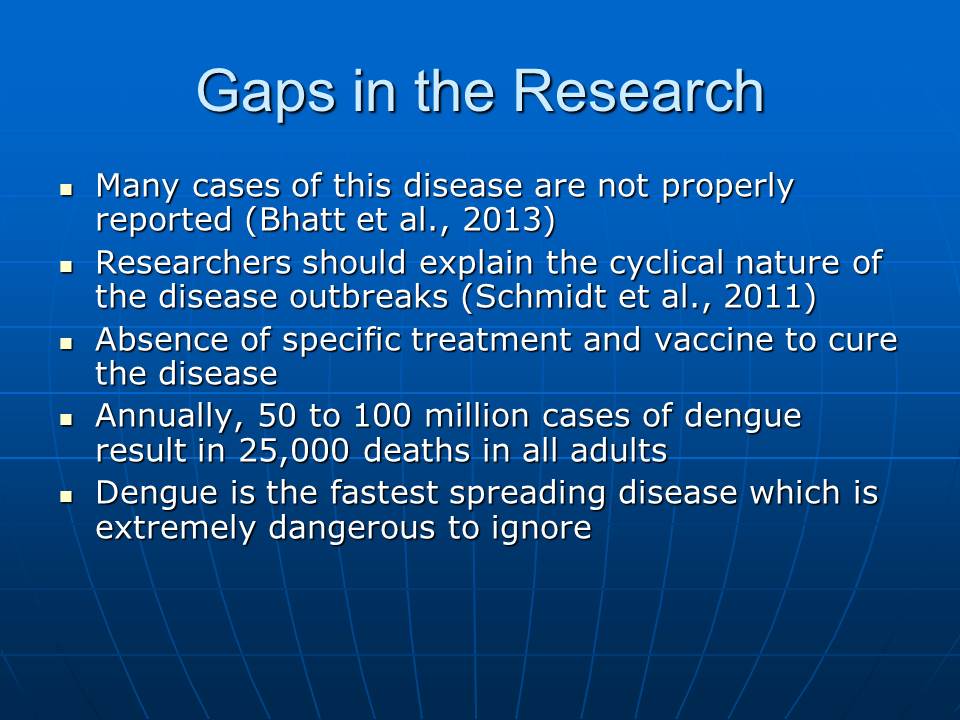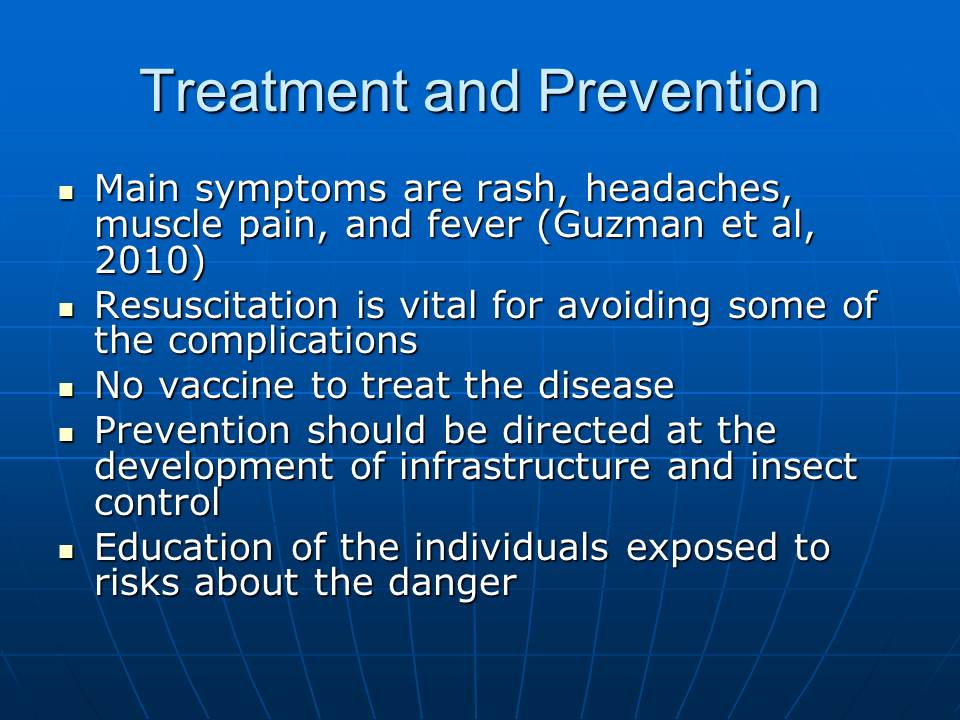Dengue Fever Threat
- Dengue is commonly referred to as the breakbone fever.
- Can be mostly observed in tropical, sub-tropical regions around the world.
- Is a mosquito-borne disease; it is transmitted by Aedes aegypti (Schmidt et al., 2011).
- Is endemic to 34 African countries (Lecture Notes, 2015).
- The first cases were reported between1823 and 1928 in Zanzibar, Burkina Faso, Egypt, South Africa and Senegal (Lecture Notes, 2015).
People in Africa may experience the same rates of exposure to dengue fever as the citizens of Latin America and South Asia, but it is impossible to determine due to the lack of research literature (Kamgang et al., 2011). Knowing the number of countries affected by dengue fever and the multiple patients infected every year it is easy to establish that this disease has gained global importance in the contemporary world. The impact dengue fever has on the public health is unclear. This is why a scientific investigation is required.

Determinants and Distribution
- Low level of income;
- High population density (facilitated by the development of urbanization);
- A mosquito becomes infected biting an infected human, after that the disease can be passed to multiple other people (Were, 2012);
- Urbanization and the increased interest to traveling have led to a considerable increase in dengue fever cases during 1960-2010;
- Climate and seasons (humidity, high temperatures, stormy weather).
Schmidt et al. (2011) note that in rural areas the disease is majorly caused by the absence of tap water as the residents have to use containers with water where the species of vector mosquitoes breed. Among other important factors affecting the spread of dengue fever there are vector productivity, viral infectivity, host defencelessness and natural elements. Besides, climate and seasons are important factors impacting the development and transmission of dengue fever. Such factors as humidity level, storms, daylight span can contribute to the spreading of dengue fever.

Gaps in the Research
- Many cases of this disease are not properly reported (Bhatt et al., 2013);
- Researchers should explain the cyclical nature of the disease outbreaks (Schmidt et al., 2011);
- Absence of specific treatment and vaccine to cure the disease;
- Annually, 50 to 100 million cases of dengue result in 25,000 deaths in all adults;
- Dengue is the fastest spreading disease which is extremely dangerous to ignore.
If the patterns according to which the disease spreads and develops could be researched and explained this would contribute immensely to the level of understanding of causes and factors contributing to the outbreaks. Dengue fever, its importance, and numbers related to its rates are often overlooked because the researchers tend to focus on other similar diseases transmitted by mosquitoes such as malaria.

Treatment and Prevention
- Main symptoms are rash, headaches, muscle pain, and fever (Guzman et al, 2010).
- Resuscitation is vital for avoiding some of the complications.
- No vaccine to treat the disease.
- Prevention should be directed at the development of infrastructure and insect control.
- Education of the individuals exposed to risks about the danger.
In order to develop and effectively implement prevention and treatment for dengue fever healthcare providers and scientists are to collect data, conduct an investigation and address the factors facilitating the development of the disease in a complex. Currently the factors contributing to the development of dengue fever can be categorized according to their character – natural (climate and seasons), socio-economical (low income of the population, high density, underdeveloped infrastructure), and scientific (vector and host defenselessness).

Reference List
Guzman, M., Halstead, S., Artsob, S., Buchy, P., Farrar, J., Gubler, D., . . . Peeling, R. (2010). Dengue: a continuing global threat. Nature Reviews, 12(2), 7-16.
Schmidt, W., Suzuki, M., Thiem, V., White, R., Tsuzuki, A., Yoshida, A., Yanai, H., . . .Ariyoshi, K. (2011). Population density, water supply, and the risk of dengue fever in Vietnam: Cohort study and spatial analysis. PLoS Medicine, 8(9), 1-10.
Kamgang, B., Marcombe, S., Chandre, F., Nchoutpouen, E., Nwane, P., Etang, J., Corbel, V., . . . Paupy, C. (2011). Insecticide susceptibility of AedesaegyptiandAedesalbopictusin Central Africa. (BioMed Central Ltd.) BioMed Central Ltd.
Lecture Notes (2015). Dengue in Africa [PowerPoint slides].
Were, F. (2012). The dengue situation in Africa. Pediatrics and International Child Health, 32(1): 18-21.